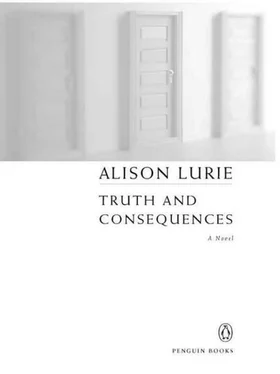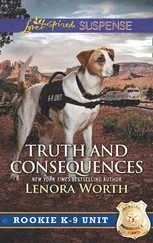“Oh, thank you.” She gave a warm, breathy sigh.
“You know, you could have locked your own door,” he whispered.
“No, I couldn’t. I couldn’t have borne it to be in there while they were yelling and pounding.”
Out in the hall, there was more loud, half-audible conversation, and then the sound of steps receding. “They’re going away,” Alan whispered.
“Maybe. Or maybe they think I’m in the washroom, and they’re going to wait downstairs for me to come out. Please don’t make me leave now.” She looked up at Alan, her silver eyes swimming with unshed silver tears. Why, she’s terrified, he thought.
“Of course not,” he said.
“He’s hateful, that reporter. You haven’t seen him, he’s a great big ugly young man like a rhinoceros, with heavy legs and feet, he frightens me so.”
“I think I have seen him,” Alan said. “Isn’t he called Tom something?”
“How should I know? But it’s not fair, this is the second time he’s come after me.” She gazed up at Alan with a blurry, frightened smile. “Yesterday he tramped right into my room with his big rhinoceros feet, when my mind was full of all those people falling through the air, the size of flies, with the smoke pouring out above them and around them, the air full of flies that were human beings. I almost told him that, but thank God I stopped myself. Instead I said I was too upset to talk. So then he asked if he could come back today. I didn’t say no, I was afraid to make him angry. But I’m not going to speak to him. There’s nothing I can say that won’t either sound stupid or get me into trouble.”
“How could it get you into trouble?”
“You can always get into trouble if you give an original answer to a journalist.” Delia sighed, and subsided onto the upholstered window seat with a flutter of lavender gauze. “They’re looking for that; they want shock and scandal. It’s especially dangerous to have an aesthetic take on any disaster. Even if you’re as horrified as everyone else, they’ll make you sound callous.”
“I know what you mean,” Alan said. “When I talked to the guy from the paper he kept asking me what I thought of the World Trade Center as an architect. The truth is I didn’t think much. It was a boring design, you know, architecturally uninteresting and out of proportion with its environment. But I definitely didn’t say that. The architecture is not the point, I said. The point is that over three thousand people are dead. I could tell it wasn’t what he wanted.”
“No,” Delia agreed. “I expect he wanted you to say that the World Trade Center was a tragic loss to American architecture.”
“Maybe. Anyhow he kept after me and kept after me, and finally I told him that it was a significant structure, one that could only have appeared at this time in history and in this country.”
“Perfect.” Delia laughed lightly. “I wish I had your presence of mind.”
Across the hall, a ringing began. “That’s your phone, I think,” Alan said.
“I’m not going to answer it. It will be the rhinoceros again, or some other awful animal.”
The ringing stopped; then it commenced again in Alan’s office.
“If they’re asking for me, don’t say I’m here. Please.” She gave him a frightened smile.
“All right,” Alan agreed. “Hello. . . . What? . . . Just a moment, let me go and look. . . . No, she’s not in her office.” Again, he realized, he had somehow become involved in a conspiracy with Delia Delaney.
“Thank you,” Delia said. “That was very convincing. And the absolute truth, too. Very neat.” She gave a silvery laugh.
“Shh, he’s probably still downstairs.”
“But maybe he’ll go away now.” Delia stood up and moved toward the window, swaying slightly toward Alan, so close that he felt the warmth of her bare arm against his. Together they looked down through the golden, windblown leaves of the big maple. “Yep, there he goes.”
“It’s the same guy that came to see me,” Alan said as two heavy figures crossed the lawn. “Very persistent, he was.”
“Yes. Awful. I hate journalists, but you have to be polite to them, or they’ll destroy you. Well.” Her voice changed as she moved away, and it was as if a cold wind were blowing on him.
She’s used me, now she’s going to leave, Alan thought. He felt an irrational disappointment and loss; and became aware again of the clawing pain in his back.
Delia crossed the room, paused by the door, and then turned. “You’re speaking next week,” she said. “I’m going to come and hear you.”
“Why?” Alan asked coldly.
“Why not?”
“Are you interested in religious architecture?”
“I could be interested,” Delia said, smiling.
He shrugged. “I’m not sure I am anymore, since last Tuesday. Who can care about religious architecture, or any architecture, after what happened to those towers?”
“They always reminded me of the sign for Gemini,” Delia said. “Communication, speed, restlessness, short journeys. You’re not a Gemini, are you?”
“No.” Alan, who despised astrology, volunteered no further information. The idea came to him that Delia was spacey as well as beautiful. “You don’t really believe that stuff, do you?”
“Oh, but I do.” Delia laughed lightly. “I believe it every Friday from two to three p.m.”
“Really.”
“It’s always fun trying on different faiths. Expands the mind. If you were a Gemini, for instance, you would have liked the World Trade Center better. You’d think of it as a kind of temple of commerce and communication.” She laughed again.
“A form of religious architecture.” Alan smiled, reassured as to her basic good sense. “You know, I have thought something like that. That you could see skyscrapers as the capitalist equivalent of church steeples. The visible connection of business to its god.”
“In that case, the World Trade Center must have been the temple to a twin god,” Delia said.
“Castor and Pollux, then, probably. They were violent gods, in charge of the city of Rome and thunder and storms.”
“I thought they were supposed to protect travelers. But I guess they didn’t always.”
“Apparently not this time,” Alan said. “Too bad I can’t say that in my lecture.”
“You can’t say it right out.” Delia gave him a sideways look. “But you could suggest it.”
“Yes. Maybe I could.” He smiled, realizing the possibilities.
“So I’ll look forward to your talk.” She turned the knob, but the door, being locked, did not open.
“Sorry, I’ll get that.” He crossed the room. Again he stood so close to Delia that he could see all the separate sparkling gilt tendrils that escaped from her braid, and breathe her scent of orange peel.
“Thank you for taking me in,” she half whispered, putting her soft white hand on his arm. Then suddenly she stood on tiptoe and kissed him. The sensation was light but very hot, as if a burning butterfly had brushed his cheek. Before Alan could react, Delia was gone.
He did not try to go after her. Instead he turned back toward the drafting table he now used as a stand-up desk, and the draft of his lecture. This morning it had lain there dead, but now the sheets of paper seemed to glow gently, and new sentences had begun to appear in his mind.
SEVEN
The automatic door of the supermarket shut behind her with its rubbery swish, and Jane was surrounded by a blast of clammy air, at least twenty degrees colder than the golden autumn outside. In her sleeveless flowered cotton dress she felt chilled almost at once, and also angry. Not only at the store, but at her husband Alan, whose pathetic request, as usual disguised as a question, had separated her from what might be one of the last warm Saturdays in her garden.
Читать дальше







![Кэмерон Доки - Правда и ее последствия[Truth and Consequences]](/books/79610/kemeron-doki-pravda-i-ee-posledstviya-truth-and-con-thumb.webp)




